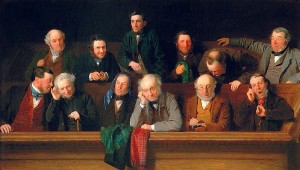A New Great Book in the Battle for Freedom! Review by Oliver DeMille
August 19th, 2015 // 2:36 pm @ Oliver DeMille
Steps to Freedom
 I read another great book today, and it rekindled my sense of hope for the future. If you care about freedom, you’ve got to read it! This new classic is Liberty’s Secrets by Joshua Charles, and it is…
I read another great book today, and it rekindled my sense of hope for the future. If you care about freedom, you’ve got to read it! This new classic is Liberty’s Secrets by Joshua Charles, and it is…
But I’m getting ahead of myself. There’s a story here, an important one. And I need to tell it in order to do justice to this book. In a world of brief sound bites and too frequently shallow media and educational conversations, a great book is easily overlooked. Such greats all too often go unnoticed because we live in an era of constant—aggressive—distraction. So to introduce a genuinely great book, we need to get this right. Here goes…
I. The Great Books
I was a young boy when first it happened, old enough to ride my bicycle to the library on hot summer afternoons and find interesting books to read, but young enough that high school sports and summer trainings weren’t yet part of my daily routine. One day under the memorable breeze of the town library’s large swamp cooler I came across a long shelf of books that boldly called themselves “The Great Books”. I stopped and stared. I re-read the title, then pondered.
“These can’t be the only great books,” I reasoned to myself. “There must be others.” Intrigued, I pulled out a volume and perused the title page, then skimmed through several chapters at the beginning of the book. I was impressed by the small print, the columns and footnotes, and the sheer quantity of big, unfamiliar words. They were downright intimidating.
I marveled a bit, rubbing my fingers along the cloth-covered bindings. I knew I would read these books some day. I just knew it.
I remember nothing specific about which volumes I investigated that day, but I skimmed many of them, reading a sentence here and another there. The afternoon passed, and I eventually returned the last volume I’d removed to its place on the shelf and went to the front counter to check out the L’Amour novel I’d selected for the week’s reading.
We lived in the desert, and it was a very hot summer, so during the exertions of my bike ride home I forget about the “Great Books”. But each time I returned to the library, I noticed them again. It seemed like none of them were ever checked out, and I could well believe it. They were truly daunting, with their gold foil lettering, fancy author names, and massive domination of shelf space.
II. Fast Forward
Today I just finished reading a truly great book on freedom, and I smiled widely as I completed the last few lines and closed the book. I removed the dust jacket and ran my fingers over the sleek black hardcover with the red foil print. “I was right, that day,” I thought to myself.
Then I realized I had been right on both counts. I would, in fact, come to read the whole set someday. I couldn’t have known at the time that I would re-read The Great Books many times, teach them extensively in multiple university, high school, and graduate level courses, and spend many hours discussing their content with colleagues, business executives, students, professionals, family members, and friends. The Great Books volumes have become dear friends over the years, and I have returned to them often for heated debates with their authors or to rehash unfinished questions in the “Great Conversation”.
But I was right about the other thing as well: there are great books beyond those in Britannica’s 54 volume set. And when I encounter an additional great book, I always feel a sense of excitement. Great books are great because they are important. That’s the major criterion. They have to be truly significant, to add meaning to our world—to innovate something that wasn’t there before the book brought it to life.
III. What Makes “Great”?
Over the decades I’ve experienced several great books beyond those from the “official list,” and they always leave an impression. Like The Closing of the American Mind by Allan Bloom, The Third Wave by Alvin Toffler, or The Five Thousand Year Leap by W. Cleon Skousen. Such books, like those by Bastiat or Austen, simply must be added to list. Along with Solzhenitsyn’s works.
In recent years I’ve come across several additional great books, like Andy Andrew’s The Final Summit, Chris Brady’s Rascal, Stephen Palmer’s Uncommon Sense, Orrin Woodward’s Resolved, Judith Glaser’s Conversational Intelligence, or Henry Kissinger’s On China. I also studied an old great book I hadn’t ever read before, The Early History of Rome, by Livy, and found greatness in its pages as well. When you read a book that is truly great, it’s a moving experience.
Such books come along rarely, so when they do it is important to pay attention. But what makes a book genuinely great? After all, greatness is a very high standard. It can’t just be good. As Jim Collins reminded us, good is too often the enemy of great.
Nor can it simply be well written. It can’t merely be accurate, detailed, beautiful, or interesting. More is necessary. It can be one, a few, or all of these things, but to be truly great, it must be also be transformational. It must change you, as you read.
IV. A New Great Book!
When I started reading Joshua Charles’ book a few days ago, I didn’t know I was in for such a treat. I had already enjoyed his earlier bestselling work, so I was ready to learn. I got my pen and highlighter out, and opened the cover. But as I read I realized that this book is truly very important. Needed. And profound.
Then, as I kept reading, I noticed that I was feeling something. A change. A different perspective. A re-direction. I was experiencing…the feelings that always accompany greatness.
Charles notes in several places that as a member of the Millennial generation he felt compelled to share this book with the world. Why? Because, in his words: “I wrote this book for one reason, and one reason only: to reintroduce my fellow countrymen to the Founders of our country and the vision of free society they articulated, defended, and constructed, in their own words.”
As a member of Generation X, I was thrilled to see a Millennial take this so seriously—and accomplish it so effectively. Even more importantly, as I read I noticed something very important, subtle but profound. Charles doesn’t make the mistake of so many modern authors who write to the experts and professionals in a field. His scholarship is excellent, and he goes a step further. He has a more important audience than mere political or media professionals. He writes to the people, the citizens, the voters, the butchers and bakers and candlestick makers—the hard-working people who make this nation go, including the artists, scientists, teachers, executives and leaders.
In so doing, he is a natural Jeffersonian, speaking the important principles of freedom, culture, economics, and leadership to a nation of people—not merely to politicos or aristos, but to everyman. To underscore this (and I doubt it was a conscious decision on his part, but rather his core viewpoint), his word choice refers not to “the American voter” but rather to “we the people.” He considers himself not merely the expert, but one of us, one of the people.
I could have hugged him for this, had he been here in person. We have far too few freedom writers today who see themselves truly as part of the citizenry. When they do come along, albeit rarely, I feel a sense of kinship and I know that their hearts are in the right place. Jefferson would be proud. For example, Charles wrote:
“We no longer know where we came from, the grand story we fit into, and the great men and women who inspired the noble vision which birthed the United States of America, the first nation in history to be founded upon the reasoned consent of a people intent on governing themselves….
“Additionally, few of us are well-read enough (a problem our educational system seems blithely unconcerned with) to discuss the lessons of the human experience (often simply called ‘history’)…”
Freedom, the classics, voracious reading, leadership, and the future—all rolled into one. “This is my kind of author,” I realized, once again. “These are the themes I emphasize when I write.” So did Jefferson. And Skousen, and Woodward. No wonder I love this book.
The Current Path
More than profound, Charles’ book is also wise. Belying his Millennial generation youth, he speaks like an orator or sage from Plutarch when he warns:
“Liberty is difficult work. It is fraught with risks, with dangers, with tempests and storms. It is a boisterous endeavor, an effort for the brave and the enterprising…”
These latter words have stayed with me since I read them several days ago. I keep remembering them. Boisterous. Brave. Enterprising.
These are the traits of a free people. In classical Greece, among the ancient Israelites, in the Swiss vales, the Saracen camps, the Anglo-Saxon villages, and the candlelight reading benches of the American founders—wherever freedom flourished. Yet today we train up a nation of youth to be the opposite. To fit in (not boisterous). To avoid risk (not brave). To focus on job security above all else (not enterprising).
If this trajectory continues, our freedoms will continue to decline.
Where and When
Speaking of freedom, Charles calls us to immediate action with his characteristic humility, depth, and conviction: “We either pass it [liberty] on to our posterity as it was passed down to us, or it dies here and now.”
Here and now? Really?
Is it that immediate? Is it truly this urgent? Is it really up to us?
The answer is clear: Yes.
Yet, it is.
“He gets it.” I smile and take a deep breath. Then I whisper to myself: “Another great book!”
I hold the book sideways and look at the many pages where I have turned down the corners. Dozens of them. Just for fun, I open one of them and read:
“…we have every reason to be doubtful of, skeptical about, and disdainful toward the notion that Caesar [government] can solve all our problems.”
I nod. When freedom is under attack, leaders rise up from among the people. This book is part of that battle.
“The Great Books indeed.” I grin as I say the words.
I turn to another page with a dog-eared corner and read Charles’ words:
“‘Society is endangered not by the great corruption of the few, but by the laxity of all,’ Tocqueville had noted, and on this he was in complete agreement with the Founders.”
And now, I note, with at least one Millennial.
I feel a sense of building hope for the future. “The Millennials are beginning to lead,” I say with reverence.
“This is big. And if this book is any indication of what’s to come…
“It’s about time,” I say aloud.
Then, slowly, “Everyone needs to read this book.”
*Liberty’s Secret by Joshua Charles is available on Amazon
Category : Aristocracy &Blog &Book Reviews &Citizenship &Community &Constitution &Culture &Current Events &Economics &Education &Featured &Generations &Government &History &Leadership &Liberty &Mission &Politics &Statesmanship
A Parable On Education and Freedom
July 30th, 2015 // 1:04 pm @ Oliver DeMille
Lines and Questions
 I was in a long line at WalMart, and I started talking with the man standing next to me. We spoke about a number of topics, including politics, and in passing I mentioned that except for military and law enforcement, private enterprises are always better than government programs. He took issue with this, arguing that the government does most things better than private entities.
I was in a long line at WalMart, and I started talking with the man standing next to me. We spoke about a number of topics, including politics, and in passing I mentioned that except for military and law enforcement, private enterprises are always better than government programs. He took issue with this, arguing that the government does most things better than private entities.
When I pressed him on this, he said that of course Washington does things better than people or businesses, because the government can keep spending as much as it wants until it gets things right.
I just stared at him.
“Seriously? It can just keep spending as much as it wants until it gets things right? That’s your big argument for the effectiveness of government?”
“Of course,” he replied. Then seeing the look of amazement and incredulity on my face, he asked, “Why? What’s wrong with that?”
“You realize that your model wastes a lot of our money, right?”
“Sure, but so what? I don’t make much, so I don’t pay much in taxes. Other people pay for government programs, so why should I care?”
I shook my head. Then I asked, “Okay, but tell me: what programs has the government got right?”
Over and Under
He cocked his head and tried to think of some.
After a bit he laughed. “Well, that’s why we’ll just have to keep trying.”
My amazement grew.
I told him the following statistics I had just seen on a news broadcast of Special Report:
Between 2008 and 2013 the Social Security Administration overpaid people in the amount of $128.3 million. That’s quite a chunk of taxpayer money. To right this wrong, the government went after these overpayments and managed to recover $109.4 million.
That’s pretty good, right? Not totally efficient, but not bad.
Then the rest of the information came out. The cost of recovering this money [just over $100 million] was $323 million, making the total loss for the taxpayers a huge amount: $213.6 million plus $18.9 million in overpayments.
That’s incredible.
Go back and look over these numbers again. It’s just plain amazing!
I could see that even the man in line thought this was ridiculous. He shook his head and sighed. “Well, we’ve got a long way to go…”
It was his turn to check out, so we left it at that.
I wonder if he votes? Or serves on juries?
Education of our citizens matters.
Category : Blog &Citizenship &Community &Culture &Current Events &Economics &Education &Featured &Generations &Government &Leadership &Liberty &Mini-Factories &Politics &Statesmanship
A Proposal on Reforming the Supreme Court
July 28th, 2015 // 8:12 am @ Oliver DeMille
by Oliver DeMille
I don’t mean it. I’m going to propose it, but I don’t really want it. Or think it’s a good idea. This proposal is meant to be ironic. But it still needs to be said, because there is far too much truth to it.
Supreme Parliament of the United States
 In the wake of recent Supreme Court decisions, it’s clear that the Court doesn’t just try cases. It now writes law. It isn’t only a Supreme Court, it’s the de facto Supreme Parliament of the United States as well.
In the wake of recent Supreme Court decisions, it’s clear that the Court doesn’t just try cases. It now writes law. It isn’t only a Supreme Court, it’s the de facto Supreme Parliament of the United States as well.
The Court uses some decisions to simply rewrite the laws of the nation, including the laws of the states. It’s been doing that for some time,[i] of course, but now it’s taking this approach to a whole new level. It has decided that the 9th and 10th Amendments are outdated, and it just ignores them.
For example, the Court labels Obamacare a “tax”, even though the Congress and President who proposed and passed it never called it that, and even though it skirts many state laws. The Court just makes up its own way.
Forget the actual case at hand; the Court is convinced that it has the power to create whatever it chooses out of thin air. Whatever the Court says, goes. Call it a “tax”. And call marriage a Constitutional right, even though the word “marriage” and the concept of marriage are never even mentioned in the Constitution or any of the Founder’s commentaries on the federal Constitution.
The Framers specifically left any and all decisions about marriage to the states. The Court has amended the Constitution without even using an official amendment.[ii] Many times. Just because it wants to.[iii] I’m not saying the Court got any of these recent decisions wrong, or right. That’s not my point. In fact, my point is much more important than any of these cases. I’m saying the Court has no authority in the Constitution to make many of its decisions.[iv]
It gave itself the power to do these things.[v] It just took the power. Such power didn’t come from the people or the Constitution.[vi] Such power isn’t legitimate authority. It is, to use the precise, technical word that the Founding generation used for this exact behavior: “tyranny”.
Whether you love the current Court’s decisions, hate them, or fall somewhere in the middle, the bigger picture is beyond the cases. The Court is now boldly and fully engaged in Judicial Tyranny.[vii]
The new rules of the Court: Just do whatever you want. You’re the Court, after all. Oh, and that pesky reality that the Constitution doesn’t give the Court the authority do more than half of what it now does? No problem. Since you’re the Court, just announce that the Constitution does, in fact, give you such authority. In fact, decree that the Court has the Constitutional authority to do whatever you decide to do.
Jefferson warned that this very thing was the biggest danger to the Constitution and to American freedoms. And his prediction has come true. The Legislative Court has become one of the greatest dangers to our freedoms. Five lawyers literally have the power to do whatever they want.
The Proposed Change!
So here’s the proposal. I heard it on a radio show, and it made me laugh. Then it made think. Then it made me mad. Check this out:
Since the Supreme Court now makes up any law it wants just by writing it up in a majority opinion, without bothering about what the House or Senate does, let’s balance the budget by just disbanding Congress. Why pay Representatives and Senators and their staff when the Court is just going to write up laws on its own anyway?
That’s the proposal. Let’s just get rid of Congress and let the Court keep doing its thing.
Again, I don’t really mean it. But at this rate, the Court is on pace to do this anyway. And in the meantime, it’s already behaving as the Supreme Court and the Supreme Parliament all in one.
One More Thing
By the way, the real solution is for Congress to pass legislation ending the use of precedent in the courts and limiting every Supreme Court decision to the scope of that one case. This will send many in the current generation of lawyers into a tizzy, but it’s the right thing to do. Assuming that we want to remain free. Such a change will immediately return the Court to its Article III powers.
Or, barring this solution, if we’re going to keep with the bad tradition of common law precedent,[viii] amend the Constitution so that 2/3 of the state Supreme Courts can overturn any decision of the Supreme Court. (More on Common Law in footnote “viii”.)
If we don’t do one of these, we literally might as well adopt the proposal above—because the Court is now operating as both the Judicial Branch and a Higher Legislative Branch.
NOTES
[i] See, for example: Martin v. Hunter Lessee; Cohen v. Commonwealth of Virginia; McCullough v. Maryland; Gibbons v. Ogden; Missouri v. Holland; New York ex rel. Cohn v. Graves; U.S. v. Butler; U.S. v. Curtiss-Wright Export Corp.; Wood v. Cloyd W. Miller; among others. See also: Bruno Leoni, Freedom and the Law, 3-25, 133-171.
[ii] Compare Article VI of the United States Constitution to Article III.
[iii] Some scholars and jurists will balk at this, arguing instead that the court “finds” or “discovers” the Constitutional meaning in the law. But while the Court may employ technical and/or logical language to support its decisions, it still utilizes its will. It may claim that its decisions are “findings,” and at times they are, but they are still always decisions. (If they were truly “findings,” matters of law without personal choice, all cases would be decided by 9-0 votes. Will is part of each decision.) Moreover, despite what is taught in some law school courses, the Framers clearly understood votes of the Justices to be acts of will, not mechanized requirements demanded by the laws.
[iv] Read Article III word for word. No such powers are granted.
[v] Review the cases listed in footnote “i” above. See also: John E. Nowak, Ronald D. Rotunda (Thompson-West), Constitutional Law, Seventh Edition, pp. 1-16, 138-156, 397-398.
[vi] Article III.
[vii] See how Raoul Berger warned of this a generation ago: Raoul Berger, Government by Judiciary.
[viii] Many in the legal profession argue that the Framers preferred Common Law to the other alternatives. Certainly there are a number of quotes from prominent founding leaders that on face value seem to support this view. In reality, most of the Framers preferred Common Law to Romano-Germanic Codifications. This was the major legal debate of the era, in Europe at least. Thus the Justinian model was soon to be followed by the Napoleonic Code. So when the Framers sided with Common Law over the Romano-Germanic model it was taken as a blanket endorsement of the Common Law. However, some of the top Founding Fathers, including both Jefferson and Madison, preferred a third model, the Anglo-Saxon code and system, over Common Law. For excellent background on these competing systems, see: Rene David and John E. C. Brierley, Major Legal Systems in the World Today; John William Burgess, The Reconciliation of Government with Liberty; Theodore F.T. Plucknett, A Concise History of the Common Law. In short, common law builds on precedent; the Constitution the Framers wrote didn’t require the use of precedent by the Judiciary. In the Framer’s model, the Court was “supreme” in deciding any one case. Period. This keeps the Court separated in the judicial realm. It is an independent judiciary, unlike in Britain, because it has sole authority to provide the final determination in any one case. But separation of powers gives it no authority to use dicta or precedent to influence later cases. Any allowance of precedent creates the need to explain a decision, and moves into the realm of legislation. Common Law was not the intent of the Framers. Once the Constitution was ratified, however, the attorneys of the era, trained in the Common Law, simply kept practicing their system without change. The Anglo Saxon code and model was quickly lost, to the detriment of American freedom. Most attorneys are unaware of this. Even a lower percentage of non-attorney citizens understand this. We lose our freedoms in many cases simply because we don’t know better.
Category : Aristocracy &Blog &Citizenship &Community &Constitution &Current Events &Education &Generations &Government &History &Leadership &Liberty &Politics &Statesmanship
TJEd & COLLEGE PART II “Titanic Education”
June 1st, 2015 // 6:04 pm @ Oliver DeMille
(To read TJEd & College Part I, click here)
Needing Greatness
 Higher education is incredibly important for today’s rising generations. As the middle class dwindles and the divide between the affluent and others widens, many of the old education/career options are becoming less viable. Today’s parents and young people simply must understand what is changing and how it affects them, or they will likely fall behind.
Higher education is incredibly important for today’s rising generations. As the middle class dwindles and the divide between the affluent and others widens, many of the old education/career options are becoming less viable. Today’s parents and young people simply must understand what is changing and how it affects them, or they will likely fall behind.
To understand what is happening, we need to step back and look at today’s education/career economy for what it actually is, not what it was twenty or thirty, or even ten years ago. Consider the following:
1-For most people in our current world higher education has become “hire” education. The idea of colleges as the place of truly great leadership education for our future community, national, business and cultural leaders has been almost entirely replaced with another view: college as career training, period. There are, of course, pros and cons to this change.
2-College majors that train for careers certainly have an important place in a successful society, but now even “hire” education is experiencing widespread and increasing mediocrity. When over half of recent college grads find themselves jobless and need to move back in with their parents, the economic reality has clearly been altered.
3-Some have argued that we should stop promoting higher education to most youth and instead emphasize tech training or simplified community college requirements with direct career prep rather than broad education. But this path will only hurt our nation. We don’t need such anti-college views to spread. Quite the contrary. We very much need “great” college views to spread. We need a lot more anti-mediocrity (and truly “great” higher education) views to go far and wide.
4-This is more than just philosophy. It has a direct economic impact on young people and their careers.
Let’s spend some time understanding how this all shakes out. First, a seismic shift is occurring in the economy, though not everyone realizes it yet. Specifically, in 2009 the United States had 18% of the world’s middle class, but it is on pace to have only 7% by 2030. (“Globalization Bites Back,” The Atlantic, May 2015) This is causing some big changes. It also has important ramifications for what kind of education we should be providing for our youth right now.
How does this apply to your family? Let’s start from the beginning.
There is much more to this article – including where the American standard of living came from and where it’s heading; where today’s parents and youth should be looking for education and jobs; why education is sinking and how to fix it; and more!
TJEd & College PART I: A Report on the Growing Importance of Higher Education
May 19th, 2015 // 6:40 am @ Oliver DeMille
The Divide
A college-level education is increasingly important in the new economy. Higher education has long created a significant divide between the “haves” and “have nots,” and by all indications this trend will intensify for the next three decades.
The gap between the affluent (we’ll call this the A Economy) and the middle class (the M Economy) is growing, and higher education is one of the clearest differences between these groups. The ranks of the lower classes (the R Economy—with R standing for “Risk”) are swelling, as more in the middle class find themselves caught in high debt and paycheck-to-paycheck living. Again, higher education marks the divide between those in the A Economy and almost everyone else.
Moreover, as North Americans compete for well-paying jobs and economic success in an increasingly global marketplace, the old system of “college degree = secure job with good benefits” no longer holds. Fewer graduates are able to maintain their parents’ lifestyle, and the middle class is dwindling.
As a result, those in the Middle Economy are left with a choice: rise to the Affluent Economy or join the Risk Economy. With career opportunities increasingly elusive for young people in this environment (in both North America and Europe), higher education has become even more important.
There is much more to this article – including where the different classes are heading; various ways of getting a great education; finding where to get your college-level education; and more!
Category : Aristocracy &Blog &Business &Citizenship &Community &Education &Entrepreneurship &Prosperity












